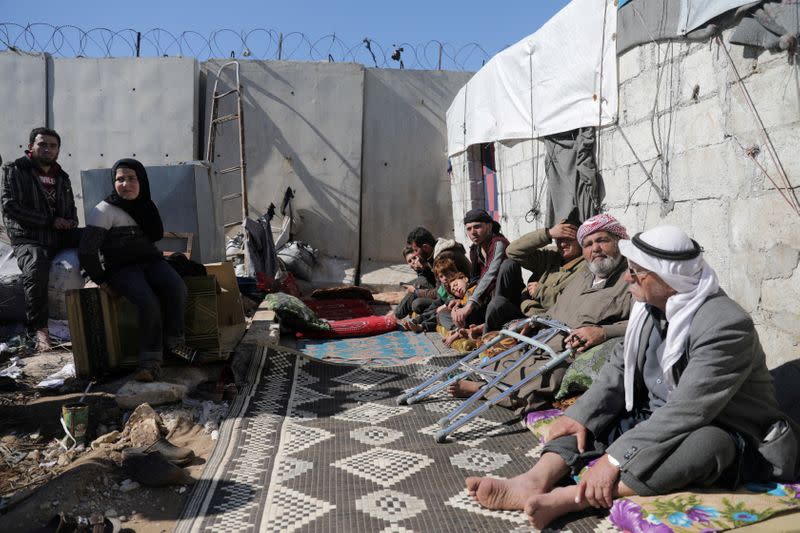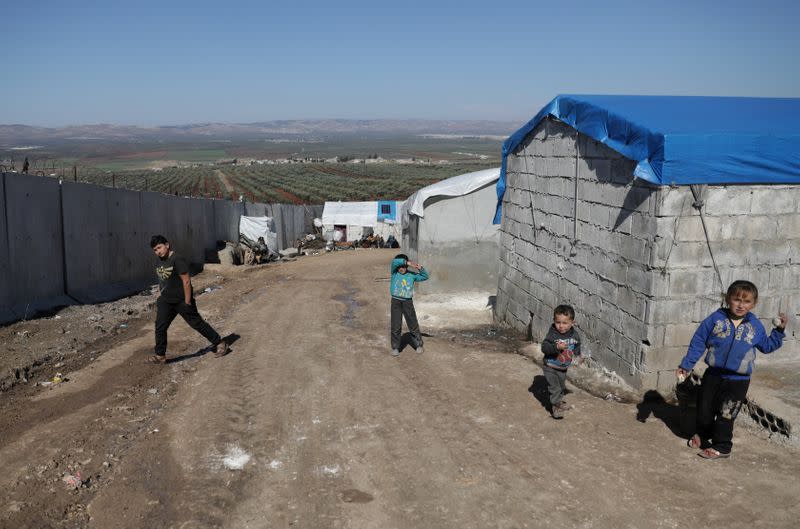Battle rages over strategic Syrian town of Saraqeb as humanitarian catastrophe unfolds
By Suleiman Al-Khalidi and Daren Butler
AMMAN/ISTANBUL (Reuters) - Syrian rebels backed by Turkish forces said on Thursday they had recaptured the crossroads town of Saraqeb, marking a first big push-back of a Syrian government offensive.
Turkish President Tayyip Erdogan said developments were turning in Ankara's favour, three weeks after the armed rebel opposition lost the northwestern town at the crossroads of two main highways to the Russian-backed Syrian government forces.
Russian state television said Turkish military specialists were using shoulder-fired missiles to try to shoot down Russian and Syrian military aircraft over Idlib province, a development that, if confirmed, would mark a serious escalation of the conflict.
Syrian warplanes also launched renewed air strikes on Thursday on residential areas of Idlib city, witnesses said.
Syrian President Bashar al-Assad's forces have pushed hard in recent months to retake the last large rebel-held region in northwestern Syria after nine years of war that has displaced millions and killed hundreds of thousands.
Turkey has sent thousands of troops and heavy military hardware into Idlib province in an incursion to back the rebels against the offensive.
Nearly a million Syrians have fled over the last three months, the biggest exodus of the war.
The United Nations said on Thursday the battle was having "catastrophic" humanitarian consequences, with the civilian death toll rising and schools and hospitals destroyed.
At least 134 civilians, including 44 children, were killed in February alone, Najat Rochdi, the United Nations' senior humanitarian adviser on northwest Syria, said in Geneva.
Seven children were among 11 people killed when an air strike hit a school in northern Idlib on Tuesday, she said.
Rochdi also reiterated a call by the United Nations Secretary-General for a ceasefire.
"There are reports of multiple children freezing to death. The needs of civilians in the northwest are exceeding the humanitarian response capacity," she said.
'OUR BATTLE WILL CONTINUE'
In Ankara, Erdogan said he would press on with the campaign as he announced that the death toll of the Turkish military forces in the region this month had risen to 21.
"Developments in Idlib have turned to our advantage. We have three martyrs, let them rest in peace. But on the other hand, the regime's losses are very big," he said in a speech.
"Our battle will continue. Our talks with the Russians continue," he said. "If there was no support from Russia or Iran, it would be impossible for Assad to stand."
Earlier, the Turkish-backed rebels said they made advances in Idlib.
"The city of Saraqeb has been liberated completely from Assad's gangs," said Naji Mustafa, spokesman for a coalition of rebel factions, the National Liberation Front.
A Russian military source cited by Russian news agencies denied that, saying Syrian government forces had successfully repelled a rebel attack on the town.
A Turkish official subsequently said Assad's forces, backed by Russian warplanes, had launched an assault to take back Saraqeb. "There are violent clashes," he told Reuters.
Government forces have seized about 60 towns and villages in southern Idlib and the adjoining province of Hama in the last three days, the Syrian Observatory for Human Rights said.
Rebels said heavy fighting was still raging in an area that the army, backed by Iranian-militias, had gained in new advances which the war monitor said had secured for the pro-government forces control of all of southern Idlib.
Opposition sources said a counter-offensive was underway.
TURKEY-RUSSIA TALKS FALTER
The push on Saraqeb comes before an end-of-February deadline set by Erdogan for Assad's forces to pull back from territory that Ankara says is part of a buffer zone agreed with Russia.
Erdogan has said Turkey would otherwise drive them back and the spokesman of his AK Party, Omer Celik, said on Thursday preparations were complete.
"When the time given to the regime to withdraw expires, the Turkish Armed Forces will carry out their duties based on the orders they receive and nobody should doubt our determination about this," Celik said.
Celik said work on a date for a meeting between Erdogan and Russian President Vladimir Putin to discuss Idlib was till ongoing. Turkish and Russian officials held a second day of talks in Ankara on Thursday. Two previous rounds in Ankara and Moscow have not yielded tangible progress.
During talks, Turkey emphasized the importance of a ceasefire in Idlib to stop a possible humanitarian catastrophe and discussed steps to take on the field to achieve it.
In Washington, the Pentagon said U.S. Defense Secretary Mark Esper had spoken with his Turkish counterpart on Thursday and they discussed the situation in Idlib, Northwest Syria and Libya.
"As President (Donald) Trump said on Tuesday, and as discussed in today's call, we are exploring ways the United States can work together with Turkey and the international community," a Pentagon readout of the call said.
As well as sending troops, tanks and artillery into the region across its border, Ankara has set up new outposts in what rebels say is preparation for a Turkish operation.
A senior opposition figure in touch with Turkey's military said the Turkish-backed campaign would continue until the Syrian army was expelled from the buffer zone, and only then would serious negotiations begin over a settlement.
Turkey, which has already taken in 3.6 million Syrian refugees, says it cannot handle another influx and has closed the border. Some migrants have made homes along the border wall, using it to prop up tents and shelters.
Ibrahim al-Idlibi, an opposition figure in touch with the rebel factions, said the seizure of Saraqeb eased pressure on rebels, who in recent days lost significant territory in southern Idlib province and Jabal al Zawiya highlands.
(Additional reporting by Tom Perry in Beirut, Andrey Kuzmin and Andrew Osborn in Moscow, Orhan Coskun and Tuvan Gumrukcu in Ankara, Omar Fahmy in Cairo, and Khalil Ashawi in Azaz, Syria; Writing by Suleiman Al-Khalidi and Daren Butler in Istanbul; Editing by Angus MacSwan and Bernadette Baum)

 Yahoo News
Yahoo News 


